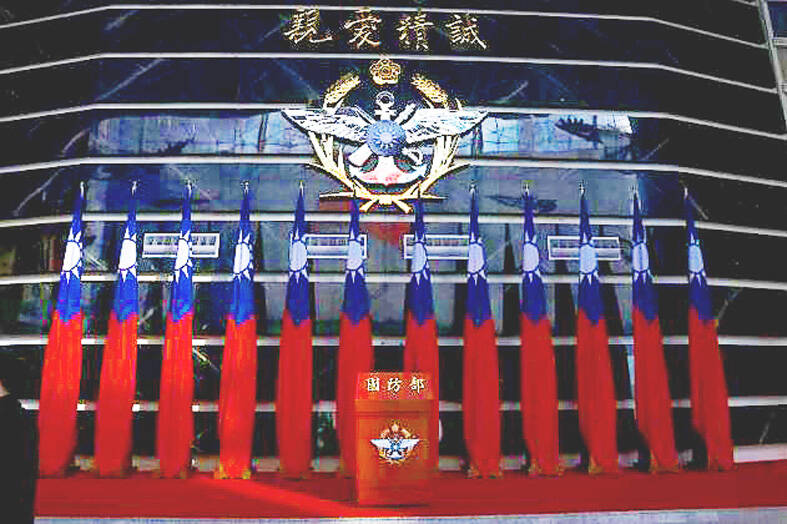The Ministry of National Defense yesterday said it plans to propose a bill to punish active military personnel who pledge loyalty to an enemy and damage military interests.
The amendment to Article 24 of the Criminal Code of the Armed Forces (陸海空軍刑法) is aimed at halting the infiltration efforts of the Chinese Communist Party (CCP).
A report released earlier this year by the National Security Bureau said that the number of Chinese spies prosecuted in Taiwan rose to 64 people last year, and 28 of them were active military personnel.

Photo: Ann Wang, Reuters
Under the proposed bill, active military personnel who pledge loyalty to an enemy — through speech, actions, words, pictures, digital records or other methods — sufficiently to harm military interests would face a prison sentence of one to seven years, the ministry said.
In the past few years, the military has collaborated with national security agencies to crack down on Chinese spying, which showed that the CCP’s espionage and spying activities are becoming more rampant, the ministry said.
In most of the spying cases, active military personnel were induced by money, investments or gambling, and were asked to sign documents or film videos to pledge their loyalty to the enemy, which seriously harms national security, it said.
It said it would submit the bill to the Executive Yuan for review after legal procedures are completed.
Under the Constitution and other laws, active military personnel must be loyal to the nation, protect its citizens and diligently perform their duty to safeguard national security, the ministry said.
A few members of the military have committed treason and unlawful acts, and under the new bill, they would not only be despised by the public, they would also not escape the law, it said.

MORE VISITORS: The Tourism Administration said that it is seeing positive prospects in its efforts to expand the tourism market in North America and Europe Taiwan has been ranked as the cheapest place in the world to travel to this year, based on a list recommended by NerdWallet. The San Francisco-based personal finance company said that Taiwan topped the list of 16 nations it chose for budget travelers because US tourists do not need visas and travelers can easily have a good meal for less than US$10. A bus ride in Taipei costs just under US$0.50, while subway rides start at US$0.60, the firm said, adding that public transportation in Taiwan is easy to navigate. The firm also called Taiwan a “food lover’s paradise,” citing inexpensive breakfast stalls

US PUBLICATION: The results indicated a change in attitude after a 2023 survey showed 55 percent supported full-scale war to achieve unification, the report said More than half of Chinese were against the use of force to unify with Taiwan under any circumstances, a survey conducted by the Atlanta, Georgia-based Carter Center and Emory University found. The survey results, which were released on Wednesday in a report titled “Sovereignty, Security, & US-China Relations: Chinese Public Opinion,” showed that 55.1 percent of respondents agreed or somewhat agreed that “the Taiwan problem should not be resolved using force under any circumstances,” while 24.5 percent “strongly” or “somewhat” disagreed with the statement. The results indicated a change in attitude after a survey published in “Assessing Public Support for (Non)Peaceful Unification

PLUGGING HOLES: The amendments would bring the legislation in line with systems found in other countries such as Japan and the US, Legislator Chen Kuan-ting said Democratic Progressive Party (DPP) Legislator Chen Kuan-ting (陳冠廷) has proposed amending national security legislation amid a spate of espionage cases. Potential gaps in security vetting procedures for personnel with access to sensitive information prompted him to propose the amendments, which would introduce changes to Article 14 of the Classified National Security Information Protection Act (國家機密保護法), Chen said yesterday. The proposal, which aims to enhance interagency vetting procedures and reduce the risk of classified information leaks, would establish a comprehensive security clearance system in Taiwan, he said. The amendment would require character and loyalty checks for civil servants and intelligence personnel prior to

The China Coast Guard has seized control of a disputed reef near a major Philippine military outpost in the South China Sea, Beijing’s state media said, adding to longstanding territorial tensions with Manila. Beijing claims sovereignty over almost all of the South China Sea and has waved away competing assertions from other countries as well as an international ruling that its position has no legal basis. China and the Philippines have engaged in months of confrontations in the contested waters, and Manila is taking part in sweeping joint military drills with the US which Beijing has slammed as destabilizing. The Chinese coast guard